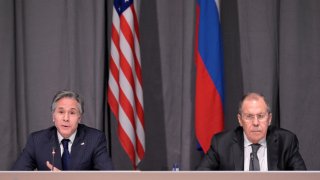Russia Commits to Continued Diplomacy as Fears of an Invasion Grow
Diplomatic talks will likely continue despite the rising tensions between Russia, Ukraine, and NATO.
During televised remarks on Monday, Russian president Vladimir Putin and foreign minister Sergey Lavrov pledged that the Kremlin would continue to pursue diplomatic talks with the West, insisting that “there is always a chance” for an agreement to be reached.
In their exchange, Lavrov told Putin that he believed leaders in Europe and North America were sufficiently considerate of Russia’s position that further dialogue could lead to positive results. He indicated that the United States had been forthcoming with policy proposals on how to reduce tensions, although NATO and the European Union, which directly border Russia, had been more reluctant to do so.
“I would suggest continuing,” the foreign minister told Putin, who agreed with his assessment.
In recent months, Russia has deployed more than 130,000 troops along its border with Ukraine, including in the Crimean Peninsula, the territory that it invaded and annexed in 2014. Moscow has insisted that the deployments are defensive in nature—a response to NATO’s eastward expansion and increased deployments in Eastern Europe—and Putin has denied intending to invade Ukraine.
In spite of these claims, Western officials have taken the Russian threat seriously. While U.S. and NATO troops have not been deployed to Ukraine, the military alliance has delivered thousands of tons of weapons and equipment to Kyiv for use against Russia in the event of an invasion.
The United States and several other Western countries have also evacuated their embassies in Kyiv. The White House indicated that the U.S. Embassy would be moved to the western city of Lviv, which is along Ukraine’s border with Poland and a safe distance away from the front line of a potential Russo-Ukrainian conflict.
While preparations for war have ramped up, diplomatic talks have also continued. In the statement announcing the embassy’s move, Secretary of State Antony Blinken suggested that the “path for diplomacy remains available if Russia chooses to engage in good faith.”
Over the weekend, President Joe Biden held a phone call with Putin, although the two leaders’ conversation yielded no new ground.
Amidst the crisis, leaders in Kyiv, including Ukrainian president Volodymyr Zelensky, have urged calm and criticized perceived hysteria in the West, noting that a Russian invasion remained far from certain and that the Ukrainian armed forces had conducted necessary preparations if one were to occur.
Trevor Filseth is a current and foreign affairs writer for the National Interest.
Image: Reuters.

